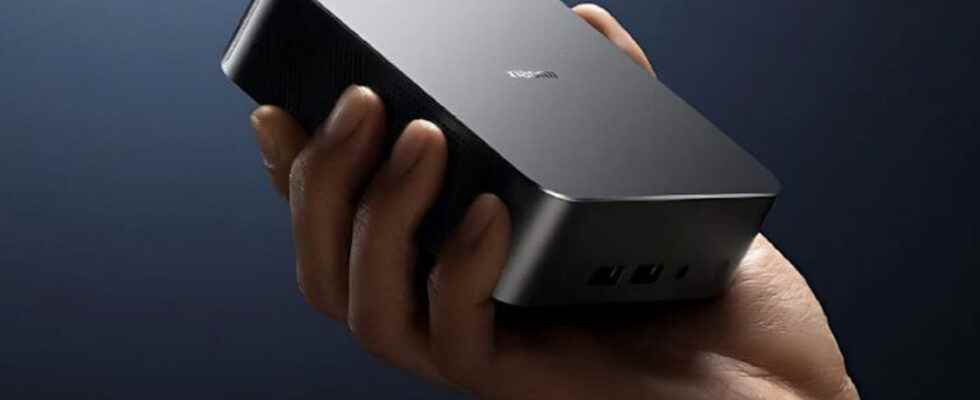After laptops, Xiaomi is entering the desktop computer market with a luxurious miniature PC equipped with a 12th generation Intel processor and many recent interfaces, Mac mini style… much smaller!
As rumors suggested, Xiaomi did unveil a PC during its major online conference on December 12, mainly devoted to the presentation of the Xiaomi 13 and 13 Pro, the new high-end smartphones from the Chinese manufacturer. In this case, it is a “desktop” computer – fixed, therefore -, but of the miniature type. An ultra-compact PC, simply called Xiaomi Mini PC, which is openly inspired by the famous Intel NUCs and models from specialized manufacturers such as Geekom, Beelink, NiPoGi or Minisforum, but also, in part, from the famous Apple Mac mini. Some experts were hoping to see another type model as well. barebones – computer to be completed –, with a larger case capable of accommodating both a large power supply and a real graphics card, but that may be for later.
We know little about it in France, but Xiaomi already manufactures PCs, in particular the Xiaomi Mi Notebook Air and Xiaomi Mi Notebook Pro, Windows laptops, reserved for the Asian market. Alas, because, according to all those who have been able to try them, these models have nothing to be ashamed of when faced with competition from prestigious brands, whether in terms of finish, display or performance – including in the face of MacBook Apple. It is also not recommended to use them in France because of their non-AZERTY keyboard. A problem that does not arise with the Mini PC insofar as it has no keyboard, like any “central unit”. Thus, even if it is not yet intended to be marketed in France – Xiaomi did not expand on this point during its conference -, we can perfectly buy it online on a foreign site and use it. with an AZERTY keyboard, like any fixed PC.
Xiaomi Mini PC: an ultra-compact and powerful computer
The Xiaomi Mini PC looks a lot like the miniature PCs already on the market. Ultra compact – it really fits in one hand – it adopts a square format of 112 x 112 x 38 mm, like most similar models, with a reduced weight – only 437 g. Significant detail, which inevitably brings to mind the Mac mini, its case is entirely metallic, which gives it a premium appearance. Inside, and contrary to what the leaks predicted, we find not an AMD Ryzen-type processor but a 12th generation Intel chip, in this case an Intel Core i5-1240P with Intel Iris X integrated graphics circuite, which can climb to a maximum of 4.4 GHz: a hybrid processor with 12 cores – 4 high performance and 8 low consumption – promising very good performance, which suggests a wide range of potential uses, including for demanding tasks . The basic version is equipped with 16 GB of DDR4 3200 MHz RAM and 512 GB of storage – a PCIe 4.0 NVMe SSD: a capacity that can be extended with an NVMe card. Like other 12 processorse Intel generation, the Core i5-1240P promises reduced consumption – it is given for a maximum thermal envelope of 65 W –, the Xiaomi Mini PC being delivered with an external power supply of 100 W. Like all mini PCs – see our tests on the MiniAir 11 and the Mini IT8, two Geekom models – it should be much more reasonable than the big towers of gamers, which is not negligible these days…
In terms of interfaces, the Xiaomi Mini PC is rather well stocked since it has two HDMI 2.1 sockets, three USB-A ports in USB 3.0 Gen2 – including one at the front -, a USB-A port in USB 2.0 at the front , two Thunderbolt 4 compatible USB-C ports, a stereo mini-jack audio output and a 2.5 Gbit/s Ethernet socket, in addition to Wi-FI 6 and Bluetooth 5.3. Enough to deal with many situations, with fast communication protocols. Especially since the HDMI sockets associated with the Iris X circuite manage the display in 4096 x 2304 pixels at 60 Hz. Enough to run 3D games in Full HD at higher frequencies.
Finally, like all current PCs, this miniature computer comes with Windows 11 pre-installed – but Xiaomi says it also works great with Ubuntu.
On paper, the Xiaomi Mini PC has serious assets to seduce, even if it does not compete directly with the Mac mini, which has an M1 chip with ARM architecture and which is mainly aimed at the Apple public. We do not yet know if it will be marketed in France, but its price in China is around 500 euros excluding tax. Even with added value and VAT, it should remain very competitive if the quality and performance are indeed there. It also shows in passing all the interest that this format of computer presents today, much better adapted to current constraints than the traditional towers, greedy and cumbersome.


